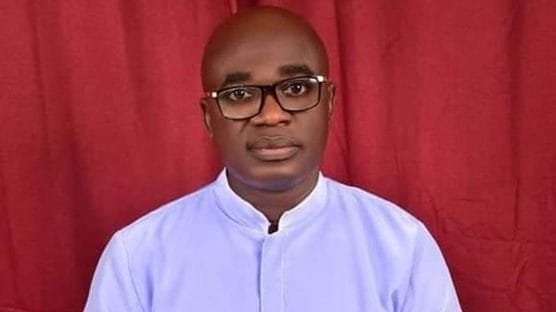[ad_1]
Hyacinth Alia, a reverend father, has always been a household name in Benue. Famous for healing the sick and exorcising demons with a sprinkle of holy water, Alia’s name fast became a point of reference for testimonies. So, when the clergy announced his decision to contest for the governorship seat in Benue under the All Progressive Congress (APC), the “Yes, father” mantra spread like wildfire throughout the north-central state.
Alia said his motivation to abandon the pulpit and vie for governorship was driven by the need to turn the state into a better place and liberate the people from poverty.
“Ignoring the mandate meant not to appreciate what God has done for the state as the food basket of the nation,” Alia said.
Despite the governorship candidate’s popularity in Benue, a lot of people do not know him other than his association with the Catholic Church. So, who is this cleric hoping to grab Benue from the grip of the Peoples Democratic Party (PDP) led by Samuel Ortom, governor of the state?
A SCHOLAR AND A PRIEST
Alia was born in Mbangur, Mbadede, Vandeikya LGA of Benue on May 14, 1966. Although he had his primary education at St. Francis primary school, Agidi, Mbatiav in Gboko LGA, Alia began his religious journey at the St. James Minor Seminary, Makurdi in 1983.
His tertiary education took him to St. Augustine’s Major Seminary, Jos, Plateau, for religious studies in 1987 and then he bagged a bachelor of arts degree in sacred theology in 1990 from an affiliate of Urbaniana University, Rome.
Alia deepened his education by acquiring a master of arts degree in religious education (psychology and counseling) in 1999 from Fordham University in New York, the United States.
He later sought an additional master’s degree in biomedical ethics from Duquesne University, Pennsylvania, US, in 2004 and a doctorate degree in the same course and the same university the following year.
EXTENSIVE CAREER AS AN ADMINISTRATOR
While in the US, Alia was appointed as the director of pastoral services, Catholic Health Services, North Campus Lauderdale Lakes, Florida, where he oversaw five full-time contract chaplains, and coordinated ethics advisory committee.
He was also the chaplain at the University of Pittsburgh Medical Center, St Joseph Mercy Health System Ann Arbo, and the coordinator and chaplain, Jamaica Hospital and Medical Queens, New York.
Alia was also the parochial vicar at the Immaculate Conception Parish, Astoria, and Our Lady of the Cenacle Parish, Richmond Hill, both in New York.
The cleric then returned to Nigeria where he served as the parochial vicar at St John’s Parish, Gboko, Benue and subsequently the assistant cathedral administrator at Our Lady of Perpetual Help Cathedral Makurdi, Benue’s capital.
Churches, which he has overseen as the parish priest, include St Jude’s Parish, Koti-Yough; St Thomas Parish Anum, Makurdi; and Christ the King Parish, Adi Etilo, Benue.
HEALING MASSES AND THE CONTROVERSIES
On July 7, 1990, Alia was ordained a Catholic priest by late Bishop Athanisius Usuh, at Our Lady of Perpetual Help Cathedral, Makurdi. It was after his ordination that his healing masses programme began.
Every Saturday, Alia would gather sick and afflicted members of the congregation and pray for them. Soon, what started out as a small congregational gathering gradually became a diocesan activity that attracted parishioners from other churches seeking miracles. Soon enough, people started dubbing the holy water he sprayed on those who came to seek divine encounters “Alia’s water”.
People with mental illnesses, physical challenges, spiritual attacks and those seeking favours made up a large percentage of the crowd with numbers doubling in subsequent gatherings. Thereafter, testimonies of healing would roll out.
But miracle-seeking Nigerians were not the only ones who noticed the young priest. Concerned persons in the Catholic Church began to raise brows and question the source of his powers and soon controversies trailed his ministry.
Succumbing to pressure, Usuh sent Alia to the Vatican for the confirmation of his healing powers.
The powers are a gift from God, the Vatican had said after the completion of its investigations.
Despite the Vatican’s confirmation, Alia was transferred to St Thomas Catholic Church, Anum, where he oversaw the renovation of the church and continued his healing programmes.
‘ANSWERING GOD’S CALL TO POLITICS’
The canon law of the Catholic church forbids its clerics from being involved in partisan politics.
As such, William Avenya, bishop of the Catholic diocese of Gboko, said Alia had been barred from public ministry until “he ceases from contumacy”, adding that the priest had been admonished severally before the action was taken.
However, the cleric said he was determined to redeem the state and that he was aware of the sacrifices required.
But his recent venture into politics has been marred by a list of setbacks and frustrations already.
Facing a stiff opposition from the PDP and within his own party, the APC governorship candidate is the first in the state to face party primary election three times and emerge victorious in all re-runs.
There have also been concerns about the position of the first lady in the state given that the priest is not married.
Alia won’t be the first cleric to rule Benue if elected, as late Moses Adasu, also a Catholic priest, had served as governor from 1992 to 1993. But all eyes are keen to see how Alia will survive his many adversaries and mount the affairs of the state, spreading his healing powers all over the land.
[ad_2]
Source link



